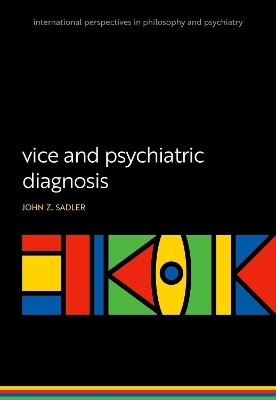
Vice and Psychiatric Diagnosis
Oxford University Press (Verlag)
978-0-19-887683-0 (ISBN)
Vice and Psychiatric Diagnosis begins with the simple question of why some categories of mental disorder include immoral or criminal conduct as diagnostic features, while most mental disorders in the DSM and ICD do not involve such "vice-laden" concepts. While this initial puzzle seems to concern only the limited domain of psychiatric nosology, Sadler's expansive scholarship reveals that this simple question leads inexorably to complex questions about the role of "madness and morality" in intellectual history, and to today's many conflicts and contradictions in the policy and culture of mental health, criminal justice, and related social welfare efforts.
The book outlines the implications of vice concepts being incorporated into psychiatric diagnosis and clinical practice, leading to some of the vexing problems in mental health and social care. These issues include the fragmentation of care in social welfare efforts involving mentally ill people, criminal offenders, intellectually disabled individuals, and juvenile offenders. The analysis extends to cultural attitudes and policies as well: the insanity defense, managing the mentally ill criminal offender, the value of punishment in criminal justice, and derivative issues such as the ethics of forensic psychiatry, the growing problem of mass shootings, stigma, health literacy, and the difficulties in pursuing rigorous and consistent approaches to psychiatric diagnostic classification.
In the pursuit of untangling these threads of vice and psychiatric diagnosis, Sadler provides a brief history of ideas about madness and morality, beginning in prehistory and extending into the late 20th century. The lessons from this history are applied in subsequent chapters, examining the "vice-mental disorder relationship" from the perspectives of philosophical/conceptual issues, the perspectives of criminal law and the criminal justice system, and the perspectives of public interest and public opinion. The concluding chapters formulate an alternative way of thinking about the vice-mental disorder relationship in clinical practice and public policy, culminating in "Forty Theses" which present the detailed conclusions and social implications for this monumental work.
John Z. Sadler, M.D. is a Professor of Psychiatry and the Daniel W. Foster, M.D. Professor of Medical Ethics at the University of Texas Southwestern Medical Center. He is Editor-In-Chief of the Johns Hopkins University Press journal, Philosophy, Psychiatry, and Psychology, celebrating its 30th year in 2023, and is a co-editor of the Oxford University Press book series, "International Perspectives on Philosophy and Psychiatry" the latter currently spanning over 50 volumes. He is the author, co-author, or co-editor of 5 volumes for Oxford University Press addressing the philosophy and ethics of mental health care.
Preface
1: Introduction
2: Vice and the DSMs - the Problem
3: Conceptual Paradoxes in Vice and Mental Disorder
4: Vice and Mental Illness - an Ancient-to-Modern Iconography
5: Building a Moral-Medical Psychiatry
6: The Legal and Criminal-Justice Context of the VMDR
7: The Public Interest Context of the VMDR
8: Deepening the Analysis of the Vice-Mental Disorder Relationship
9: Forty Theses: Conclusions, Implications, Prescriptions
Bibliography
| Erscheinungsdatum | 16.03.2024 |
|---|---|
| Reihe/Serie | International Perspectives in Philosophy and Psychiatry |
| Verlagsort | Oxford |
| Sprache | englisch |
| Maße | 176 x 254 mm |
| Gewicht | 1240 g |
| Themenwelt | Geisteswissenschaften ► Philosophie |
| Medizin / Pharmazie ► Gesundheitswesen | |
| Medizin / Pharmazie ► Medizinische Fachgebiete ► Psychiatrie / Psychotherapie | |
| ISBN-10 | 0-19-887683-1 / 0198876831 |
| ISBN-13 | 978-0-19-887683-0 / 9780198876830 |
| Zustand | Neuware |
| Informationen gemäß Produktsicherheitsverordnung (GPSR) | |
| Haben Sie eine Frage zum Produkt? |
aus dem Bereich


